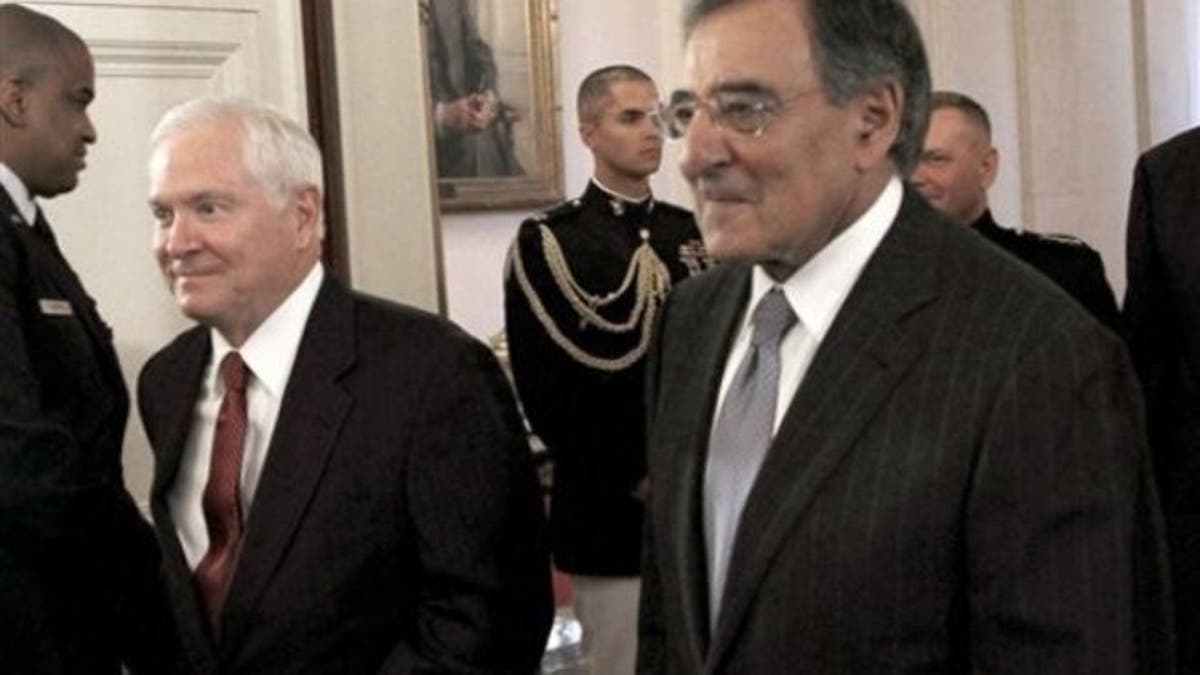
September 21, 2010: Former defense secretaries Robert Gates, left, and Leon Panetta, who was CIA Director at the time. (AP Photo)
Former defense secretaries Robert Gates and Leon Panetta criticized President Obama's strategy regarding the Syrian civil war Tuesday, with both agreeing that Obama should not have sought the approval of Congress for a military strike against the forces of Syrian President Bashar al-Assad.
Speaking at a forum in Dallas, Gates and Panetta, Obama's first two defense secretaries, disagreed on whether the United States should ultimately carry out a military strike in retaliation for a chemical attack that the U.S. says killed 1,400 people. However, both expressed skepticism (and occasionally sarcasm) about ongoing negotiations, led by Russia, for Assad to hand over his stockpile of chemical weapons to the international community.
Panetta said he supported a strike because Obama needed to enforce the "red line" he set over Syria's use of chemical weapons.
"When the president of the United States draws a red line, the credibility of this country is dependent on him backing up his word," Panetta said.
But Gates said a strike would be like "throwing gasoline on an extremely complex fire in the Middle East." He brought up past interventions in Iraq, Afghanistan and Libya as examples of how American military action can lead to unintended consequences.
He also dismissed attacking Syria to enforce a red line.
"I believe to blow a bunch of stuff up over a couple of days to underscore or validate a point or principle is not a strategy," he said.
Obama had been pushing for a military strike on Syria in retaliation for a chemical attack the U.S. blames on Assad's forces, but that is on hold as a he pursues a diplomatic initiative.
U.S. and Russian officials reached an agreement over the weekend to inventory Syria's chemical weapons programs within a week and remove all of them by the middle of next year. State Department spokeswoman Jen Psaki said the five permanent members of the United Nations Security Council were discussing a resolution. The U.S. and France want to include a military option if enforcement fails, which Russia opposes.
Both Gates and Panetta spoke freely -- and often critically -- about how they would handle Syria differently.
Gates, who was appointed secretary of defense by former President George W. Bush and retained by Obama, said he thought America's most recent presidents "have become too quick to reach for a gun to solve an international problem."
He said the U.S. should try to covertly arm "selected rebel groups" in Syria, but not with surface-to-air missiles. The U.S. should also push for Assad to be labeled a war criminal, for warrants to be issued for his arrest and for a seizure of his family's assets abroad, Gates said.
As for negotiations with Russia, Gates said the U.S. should push for more authority and strict demands on complying with any terms of an agreement.
Asked if he trusted Russian President Vladimir Putin, Gates said: "My answer would be, are you kidding me?"
Panetta, who replaced Gates and served until earlier this year, said he would have told Obama not to go to Congress once he decided military action was needed.
"Mr. President, this Congress has a hard time agreeing as to what the time of day is," he said.
For Obama to not back up his words with a strike would embolden Iran on nuclear weapons and other American enemies, Panetta said.
Once the president drew a red line, Panetta said, "Damn it, you've got to do it."
The Associated Press contributed to this report.
























